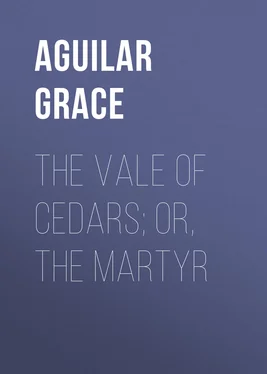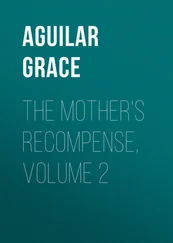Grace Aguilar - The Vale of Cedars; Or, The Martyr
Здесь есть возможность читать онлайн «Grace Aguilar - The Vale of Cedars; Or, The Martyr» — ознакомительный отрывок электронной книги совершенно бесплатно, а после прочтения отрывка купить полную версию. В некоторых случаях можно слушать аудио, скачать через торрент в формате fb2 и присутствует краткое содержание. Жанр: Альтернативная история, foreign_antique, foreign_prose, Исторические приключения, на английском языке. Описание произведения, (предисловие) а так же отзывы посетителей доступны на портале библиотеки ЛибКат.
- Название:The Vale of Cedars; Or, The Martyr
- Автор:
- Жанр:
- Год:неизвестен
- ISBN:нет данных
- Рейтинг книги:3 / 5. Голосов: 1
-
Избранное:Добавить в избранное
- Отзывы:
-
Ваша оценка:
- 60
- 1
- 2
- 3
- 4
- 5
The Vale of Cedars; Or, The Martyr: краткое содержание, описание и аннотация
Предлагаем к чтению аннотацию, описание, краткое содержание или предисловие (зависит от того, что написал сам автор книги «The Vale of Cedars; Or, The Martyr»). Если вы не нашли необходимую информацию о книге — напишите в комментариях, мы постараемся отыскать её.
The Vale of Cedars; Or, The Martyr — читать онлайн ознакомительный отрывок
Ниже представлен текст книги, разбитый по страницам. Система сохранения места последней прочитанной страницы, позволяет с удобством читать онлайн бесплатно книгу «The Vale of Cedars; Or, The Martyr», без необходимости каждый раз заново искать на чём Вы остановились. Поставьте закладку, и сможете в любой момент перейти на страницу, на которой закончили чтение.
Интервал:
Закладка:
"Never!" was the solemn rejoinder, and not a word more passed between them. He followed her through what seemed to be an endless maze, and paused before a towering rock, which, smooth and perpendicular as a wall built by man, ran round the vale and seemed to reach to heaven. Pushing aside the thick brushwood, Marie stood beside the rock, and by some invisible movement, a low door flew open and disclosed a winding staircase.
"Thou wilt trust me, Arthur?"
"Ay, unto death," he answered, springing after her up the rugged stair. Narrow loopholes, almost concealed without by trees and brushwood, dimly lighted the staircase, as also a low, narrow passage, which branched off in zig-zag windings at the top, and terminated, as their woody path had done, in a solid wall. But again an invisible door flew open, closing behind them; and after walking about a hundred yards through prickly shrubs and entangled brushwood that obscured his sight, Marie paused, and Arthur gazed round bewildered. A seemingly boundless plain stretched for miles around him, its green level only diversified by rocks scattered about in huge masses and wild confusion, as if hurled in fury from some giant's hand. The rock whence he had issued was completely invisible. He looked around again and again, but only to bewilder himself yet more.
"The way looks more dreary than it is. Keep to the left: though it seems the less trodden path thou wilt find there a shelter for the night, and to-morrow's sun will soon guide thee to a frontier town; thy road will be easy then. Night is falling so fast now, thou hadst best not linger, Arthur."
But he did linger, till once more he had drawn from her a confession of her love, that none other could take his place, even while she conjured him never to seek her again—and so they parted. Five minutes more, and there was not a vestige of a human form on the wide-extended plain.
CHAPTER III
"Now History unfolds her ample page,
Rich with the spoils of Time."
Clearly to comprehend the internal condition of Spain at the period of our narrative (1479)—a condition which, though apparently purely national, had influence over every domestic hearth—it is necessary to glance back a few years. The various petty Sovereignties into which Spain had been divided never permitted any lengthened period of peace; but these had at length merged into two great kingdoms, under the names of Arragon and Castile. The form of both governments was monarchical; but the genius of the former was purely republican, and the power of the sovereign so circumscribed by the Junta, the Justicia, and the Holy Brotherhood, that the vices or follies of the monarch were of less consequence, in a national point of view, in Arragon, than in any other kingdom. It was not so with Castile. From the death of Henry the Third, in 1404, a series of foreign and civil disasters had plunged the kingdom in a state of anarchy and misery. John the Second had some virtues as an individual, but none as a king; and his son Henry, who succeeded him in 1450, had neither the one nor the other. Governed as his father had been, entirely by favorites, the discontent of all classes of his subjects rapidly increased; the people were disgusted and furious at the extravagance of the monarch's minion; the nobles, fired at his insolence; and an utter contempt of the king, increased the virulence of the popular ferment. Unmindful of the disgrace attendant on his divorce from Blanche of Navarre, Henry sought and obtained the hand of Joanna, Princess of Portugal, whose ambition and unprincipled intrigues heightened the ill-favor with which he was already regarded. The court of Castile, once so famous for chastity and honor, sank to the lowest ebb of infamy, the shadow of which, seeming to extend over the whole land, affected nobles and people with its baleful influence. All law was at an end: the people, even while they murmured against the King, followed his evil example; and history shrinks from the scenes of debauchery and licentiousness, robbery and murder, which desecrated the land. But this state of things could not last long, while there still remained some noble hearts amongst the Castilians. Five years after their marriage, the Queen was said to have given birth to a daughter, whom Henry declared should be his successor, in lieu of his young brother Alfonso (John's son, by a second wife, Isabella of Portugal). This child the nobles refused to receive, believing and declaring that she was not Henry's daughter, and arrogated to themselves the right of trying and passing sentence on their Sovereign, who, by his weak, flagitious conduct had, they unanimously declared, forfeited all right even to the present possession of the crown.
The confederates, who were the very highest and noblest officers of the realm, assembled at Avita, and with a solemnity and pomp which gave the whole ceremony an imposing character of reality, dethroned King Henry in effigy, and proclaimed the youthful Alfonso sovereign in his stead. All present swore fealty, but no actual good followed: the flame of civil discord was re-lighted, and raged with yet greater fury; continuing even after the sudden and mysterious death of the young prince, whose extraordinary talent, amiability, and firmness, though only fourteen, gave rise to the rumor that he had actually been put to death by his own party, who beheld in his rising genius the utter destruction of their own turbulence and pride. Be this as it may, his death occasioned no cessation of hostilities, the confederates carrying on the war in the name of his sister, the Infanta Isabella. Her youth and sex had pointed her out as one not likely to interfere or check the projects of popular ambition, and therefore the very fittest to bring forward as an excuse for their revolt. With every appearance of humility and deference, they offered her the crown; but the proudest and boldest shrank back abashed, before the flashing eye and proud majesty of demeanor with which she answered, "The crown is not yours to bestow; it is held by Henry, according to the laws alike of God and man; and till his death, you have no right to bestow, nor I to receive it."
But though firm in this resolution, Isabella did not refuse to coincide in their plans for securing her succession. To this measure Henry himself consented, thus appearing tacitly to acknowledge the truth of the reports that Joanna was a surreptitious child, and for a brief period Castile was delivered from the horrors of war. Once declared heiress of Castile and Leon, Isabella's hand was sought by many noble suitors, and her choice fell on Ferdinand, the young King of Sicily, and heir-apparent to the crown of Arragon. Love was Isabella's incentive. Prudence, and a true patriotic ambition, urged the Archbishop of Toledo not only to ratify the choice, but to smooth every difficulty in their way; he saw at once the glory which might accrue to Spain by this peaceful union of two rival thrones. Every possible and impossible obstacle was privately thrown by Henry to prevent this union, even while he gave publicly his consent; his prejudice against Ferdinand being immovable and deadly. But the manoeuvres of the Archbishop were more skilful than those of the King. The royal lovers—for such they really were—were secretly united at Valladolid, to reach which place in safety Ferdinand had been compelled to travel in disguise, and attended only by four cavaliers; and at that period so straitened were the circumstances of the Prince and Princess, who afterwards possessed the boundless treasures of the new world, that they were actually compelled to borrow money to defray the expenses of their wedding!
The moment Henry became aware of this marriage, the civil struggle recommenced. In vain the firm, yet pacific Archbishop of Toledo recalled the consent he had given, and proved that the union not only secured the after-glory of Spain, but Henry's present undisturbed possession of his throne. Urged on by his wife, and his intriguing favorite, the Marquis of Villena, who was for ever changing sides, he published a manifesto, in which he declared on oath that he believed Joanna to be his daughter, and proclaimed her heiress of Castile. Ferdinand and Isabella instantly raised an array, regardless of the forces of Portugal (to whose monarch Joanna had been betrothed), who were rapidly advancing to the assistance of Henry. Ere, however, war had regularly commenced, a brief respite was obtained by the death of Henry, and instantly and unanimously Isabella was proclaimed Queen of Leon and Castile. Peace, however, was not instantly regained; the King of Portugal married Joanna, and resolved on defending her rights. Some skirmishing took place, and at length a long-sustained conflict near Fero decided the point—Ferdinand and the Castilians were victorious; the King of Portugal made an honorable retreat to his own frontiers, and the Marquis of Villena, the head of the malcontents, and by many supposed to be the real father of Joanna, submitted to Isabella. Peace thus dawned for Castile; but it was not till three years afterwards, when Ferdinand had triumphed over the enemies of Arragon, and succeeded his father as Sovereign of that kingdom, that any vigorous measures could be taken for the restoration of internal order.
Читать дальшеИнтервал:
Закладка:
Похожие книги на «The Vale of Cedars; Or, The Martyr»
Представляем Вашему вниманию похожие книги на «The Vale of Cedars; Or, The Martyr» списком для выбора. Мы отобрали схожую по названию и смыслу литературу в надежде предоставить читателям больше вариантов отыскать новые, интересные, ещё непрочитанные произведения.
Обсуждение, отзывы о книге «The Vale of Cedars; Or, The Martyr» и просто собственные мнения читателей. Оставьте ваши комментарии, напишите, что Вы думаете о произведении, его смысле или главных героях. Укажите что конкретно понравилось, а что нет, и почему Вы так считаете.












